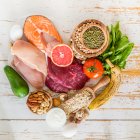Related articles
-
 Ever Wondered How to Make Paneer at Home? Here is the Complete Guide to Take Out Soft and Creamy Paneer from Milk at Home (2021)
Ever Wondered How to Make Paneer at Home? Here is the Complete Guide to Take Out Soft and Creamy Paneer from Milk at Home (2021)
-
 Want More Tantalizing Breakfast Ideas? Here are 6 Scrumptious Egg Recipes for Breakfast That Will Make You Want to Eat Eggs All Day (2020)
Want More Tantalizing Breakfast Ideas? Here are 6 Scrumptious Egg Recipes for Breakfast That Will Make You Want to Eat Eggs All Day (2020)
-
 How to Increase Weight: Foods to Include in Your Diet for Your Weight Gain Journey + Tips for Gaining Weight (2020)
How to Increase Weight: Foods to Include in Your Diet for Your Weight Gain Journey + Tips for Gaining Weight (2020)
Importance of Eating Seasonally
Seasonal eating is not a new concept and it makes sense to buy fruits and vegetables that are in-season. Choosing food according to the season has its own benefits and it is the best way to get nutritionally dense produce. Besides, you get a chance to taste the fresh flavours of food grown during that particular season. Moreover, it is environmentally friendly too. Eating seasonally will reduce the demand for non-season produce, which means less transportation, less refrigeration and you will be supporting the local farmers.
Seasonal foods are fresh and taste better. You will get full nutritional benefits and they cost less as well. Eating seasonal foods also supports the nutritional needs of your body. Here’s a list of 10 foods that you must eat in winters and how you can incorporate them in your diet to boost your health, but before that, here are some food categories to definitely avoid in the winters.
Foods to Avoid During Winters
Fast Food:
In cold weather, you are often tempted to eat warm comforting food like fast food. However, these are loaded with sugar and high calories. A better option would be home cooked food that will not only fill your belly, but is nutritious and satiating as well.White Food Items:
Whether it is white bread, white pasta or white flour, you need to avoid them. The refined carbs in these foods are highly inflammatory, which can lead to several health issues. Instead, go for whole grain and gluten free varieties that are easier to digest, and have less calorific value. Try to use jowar or millet flour to make bhakri, which is rich in fibre and one of the best options for winters.Cold Dairy Products:
You must also avoid dairy products in winters, especially if you have asthma, as these foods are mucus-generating, which may trigger wheezing and aggravate infections if already present.
Best Winter Foods to Consume for Wellness and Boost Immunity
1. Root Vegetables
During the cold weather, many of you don’t think much about veggies, as it is that time of the year when you want to enjoy hot cocoa, coffee and holiday cookies. Like summer is popular for juicy melons and mangoes, in the cold temperatures, root vegetables thrive and are quite flavourful during this time. Generally, any edible part of the plant that grows beneath the soil surface is considered a root veggie like sweet potatoes, beets, carrots, turnips and radish. These veggies also function as the root unlike onions. Even though onions grow beneath the soil surface, they are not a root vegetable as onions don’t function as the plant's root.
As roots absorb all the essential nutrients and moisture from the soil, they are nutrient-dense. They have high antioxidant content that can help fight off diseases and detoxify your body. These vegetables are also packed with minerals and vitamins. Many of the root vegetables are also starchy and carb-heavy, but the complex and slow-burning carbs will not spike your blood sugar. In fact, they will keep you full longer. These vegetables also have high dietary fibre and are low in calories. They help keep your body warm as they digest slowly, which generates heat in the body. From salad, grilled or roasted veggies to warm soupy stews, root vegetables can make a delicious and comforting winter dish that are quite irresistible.
2. Winter Spices
Most of you crave for warm comforting foods during the bleak winter months. This is also the time when you become vulnerable to airborne infections like flu and cold. One way to prevent such infections and improve your immunity is to include rich, warm and flavourful spices in your diet. Incorporating spices in cooking will keep you fit and relieve you from the winter blues.
Ginger, cinnamon, cardamom, cloves, fennel, turmeric, nutmeg, etc. are some of the spices that will not only add flavour to your dishes, but are also beneficial for your health. The spices not only fill your kitchen with aroma, but also have a warming effect. They are also low in cholesterol and saturated fat, which are also great reasons to include them in your cooking. From sweet to savoury, you can use these spices in a variety of food preparations.
3. Nuts
Nuts are warm in nature and hence perfect to feast on during the cold weather. Besides keeping you warm, nuts will also nourish and strengthen your body. Nuts, seeds and dried foods have rich fibre content, which is helpful in diabetes management as well. The fibre in the nuts also aids in digestion and keeps you feeling fuller for long. Hence, it also helps in reducing weight. Dry fruits such as peaches, pistachios, dates, etc. are not only delicious, but are packed with enzymes, fibre, minerals, oils and vitamins, which are vital to maintain an excellent health. So, snack on a handful of nuts in the day to ward off any infection or other problems in the winter.
4. Cabbage
This cruciferous vegetable thrives during the winter season. Available in red and green colours, both are healthy and have a good nutrient profile. Cabbage is budget-friendly and provides nutrients such as vitamin A, C, K and B (thiamine and folate) and vitamin B6. You can reap several wonderful benefits by including cabbage in your winter diet. Vitamin C is beneficial to improve your immune system and prevents many diseases. Cabbage is also rich in sinigrin, a compound known to prevent cancer. Like other leafy veggies, cabbage also has anti-inflammatory and antioxidant properties. It is also a versatile veggie that can be used to make stuffed wraps, soups and salads.
5. Citrus Fruits
Winters can be tough and many of you prefer to stay indoors during this time. However, one of the bright spots is that citrus fruits are available in plenty. Although a variety of citrus fruits are available all through the year, during the winters, these fruits are at their peak flavours. Besides their bright appearance and fresh flavours, citrus fruits are perfect to include in your diet during winters as they are packed with vitamin C. As you all know, vitamin C boosts your immune system that helps combat illness. These fruits also have good amount of fibre, which aids in digestion and keeps you full. Snacking on citrus fruits instead of your regular snacks will cut down on calories and help manage your weight. There are various ways to include citrus fruits in your diet, from salads, juices to adding the fruit zest to your baked goodies, you can use them to add a flavourful twist to your dishes.
6. Pomegranates
Pomegranates are one of the oldest cultivated fruits in the world. The hidden tart-sweet jewels inside this superfood can brighten up a cold winter day. The fruit is a rich source of vitamin C, potassium and various nutrients that boost your body’s defence against infections such as flu and common cold that occur during the winters. The antioxidants in pomegranate reduce free radical activity, thereby preventing various disorders and boosting your immunity. There are various ways to include this fruit in your diet. You can blend pomegranate seeds, which is preferred over extracting the juice, as it retains the fibre content. You can add it to your fruit bowls and salads, which will not only give a crunchy texture, but also enhance its flavours.
7. Winter Squash
This is the ideal food to include in your diet in the cold months. Packed with immune-enhancing nutrients, this versatile vegetable can be steamed, baked, pureed to make soup and smoothies. For centuries, winter squash has been valued for its medicinal properties and rich protein content. It is a very good source of vitamin A. A cup of winter squash fulfils 59% of your daily requirement of vitamin A. It is also packed with fibre, vitamin C and B, and minerals like potassium. It also contains a special class of carbs that have antioxidant, anti-inflammatory, and insulin-and cholesterol regulating properties. This filling, inexpensive and tasty squash is not as perishable due to its thick skin and can be stored for up to 3 months under the right conditions. So, impress your taste buds by including this superfood in your winter diet and enjoy its great taste, colour and texture.
8. Sesame Seeds
Sesame (til) seeds are native to India and one of the oldest known oil seeds. These seeds are very nutritious. They are packed with good fats and therefore they are naturally warm and widely used in various winter sweets. The sesame seeds are used in traditional foods prepared during winter festivals such as Makar Sankranti in South Indian and Lohri in North India. Due to its warming properties, sesame seeds are used in several homemade sweets prepared especially in winters like Til Ladoos, Til Barfi, Gajak, Rewari, etc., which are packed with nutrients and are incredibly delicious as well.
9. Tulsi
Holy basil or tulsi is one of the common houseplants in India, which is known to cure several ailments including flu, cold and cough that are quite common in the winters. The plant has anti-infective and anti-asthmatic properties and is recommended by Ayurveda to build respiratory resistance. It is also a rich source of zinc, vitamins A and C. It boosts your immunity and will keep your body warm, especially during winters. One way to consume tulsi leaves is in the form of tea. Boil few fresh tulsi leaves with a piece of ginger root in a cup of water for 3-4 minutes. Add jaggery and remove from the heat. Strain and drink the hot tea.
10. Fermented Food
Its well-known that probiotics are beneficial for your digestive health. Probiotics help to rejuvenate good bacteria in the gut and eliminate bad bacteria. In winters especially, probiotics play an important role in maintaining your health. The good bacteria helps to fight off infections caused by microorganisms. It can also treat digestive disorders such as irritable bowel syndrome (IBS). The immunity of your body increases with a healthy gut. So, a daily dose of probiotics in winters is a must to protect your body. The important sources of probiotics include:
- Bananas – Bananas are both prebiotic and probiotic and are packed with potassium.
- Yogurt – This is perhaps the best source of probiotics. Yogurt will not only relieve symptoms of IBS, but also reduce incidences of diarrhoea in kids caused due to antibiotics.
- Kimchi – This popular Korean dish has lactobacillus (lactic acid bacteria) and is beneficial for your digestive health.
- Sauerkraut – This is a type of fermented cabbage believed to have originated about 2,000 years ago in China. This popular probiotic-rich side-dish improves gut microbiome during winters. Include probiotics in your winter diet to stay away from infections and improve healthy microbes in the gut.
Do's and Don'ts in Winters
In India winters are shorter, but in certain regions especially the northern parts of the country they are bitterly cold. As the weather gets colder, you are susceptible to coughs, colds and fever. The weather also makes you lazy and getting up early and exercising takes more will power. Here are certain do's and don’ts to follow in winters to keep yourself fit:
- Increase Vitamin C Intake – Citrus fruits like lime and oranges are rich in vitamin C, which is known to protect against infections.
- Manage Stress – Stress affects your immune system and low immunity means you are prone to illness. Get adequate sleep, which is one way to manage your stress.
- Exercise – You need not follow a vigorous exercise regime, but a mild workout like climbing stairs or a few stretching exercises in the morning is adequate enough to keep your body warm and fit during the winters.
- Follow a Good Diet – Include foods that are rich in fibre, which will not only avoid winter weight gain, but also maintain a good digestive system. Eat citrus fruits and leafy-green vegetables and foods that are rich in omega 3 fatty acids like plant seeds, nuts and fish. Also, drink plenty of fluids to fight winter dehydration. Avoid hot beverages like tea and coffee.
- Avoid Comfort Food – It is tempting to eat fat and carb loaded comfort foods in the cold weather. However, this will not only leave your lethargic, but will also result in weight gain. As much as possible include nutrient-dense foods in your diet.
- Don’t Forget Skin and Hair Care – Winters can be harsh on your skin and hair. The best way to avoid dryness, cracking, etc. is to use a good moisturiser. Your tresses also become brittle and dry in the cold weather resulting in breakage. So, use a good conditioner to moisturise and avoid blow-drying and heat-styling tools.
Related articles
-
 Ever Wondered How to Make Paneer at Home? Here is the Complete Guide to Take Out Soft and Creamy Paneer from Milk at Home (2021)
Ever Wondered How to Make Paneer at Home? Here is the Complete Guide to Take Out Soft and Creamy Paneer from Milk at Home (2021)
-
 Gained Extra Weight in the Lockdown? Best Slimming Tea to Get in the Right Shape and Live a Healthier Life
Gained Extra Weight in the Lockdown? Best Slimming Tea to Get in the Right Shape and Live a Healthier Life
-
 From Usage in Skincare to Treating Wounds Quickly, Castor Oil Has a Lot of Applications You May Have Never Heard of: Benefits of Using Castor Oil (2021)
From Usage in Skincare to Treating Wounds Quickly, Castor Oil Has a Lot of Applications You May Have Never Heard of: Benefits of Using Castor Oil (2021)
-
 जिम जाने के लिए चुने यह 10 2020 के सबसे बेस्ट जिम बैग्स जो है दिखने में बेहद शानदार और बेहतरीन। साथ में कुछ सुझाव और अन्य जानकारी ।(2020)
जिम जाने के लिए चुने यह 10 2020 के सबसे बेस्ट जिम बैग्स जो है दिखने में बेहद शानदार और बेहतरीन। साथ में कुछ सुझाव और अन्य जानकारी ।(2020)
-
 Get That Well Toned and Perfectly Sculpted Body in the Comfort of Your Home. Your Quick Guide to the Best Home Gym Equipment in India and Why You Need to Get One Now (2021)
Get That Well Toned and Perfectly Sculpted Body in the Comfort of Your Home. Your Quick Guide to the Best Home Gym Equipment in India and Why You Need to Get One Now (2021)
Don't Let Your Guard Down in the Winters
Winters is the time when you should definitely not let your guard down and remain extra cautious about your diet and health. We hope this BP Guide would have helped you decide which must-have foods you should definitely make a part of your routine diet this winter and maintain your health and immunity at an optimum level throughout the season. Stay connected with us for more such engaging content.